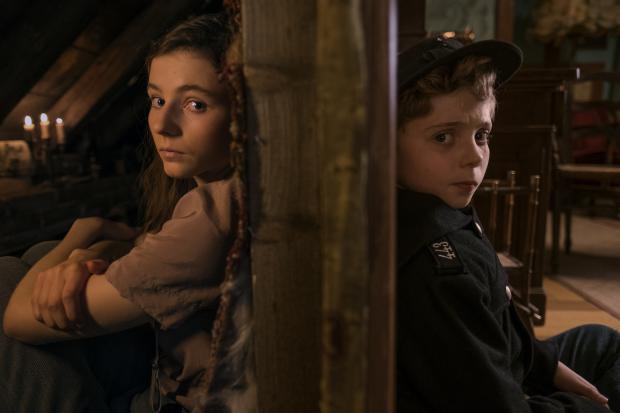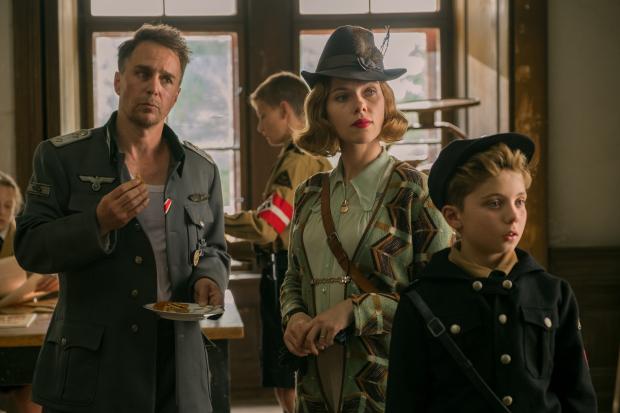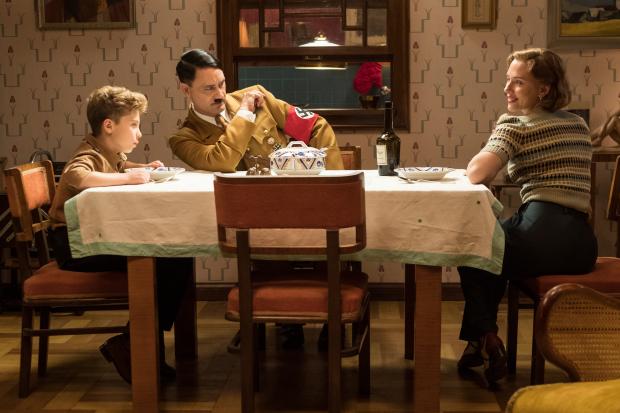Maori moviemaker Taika Waititi’s Jojo Rabbit is in the tradition of Charlie Chaplin’s 1940 anti-Nazi masterpiece The Great Dictator. Rabbit blasts off with a laugh-out-loud sequence comparing Beatle-mania-like celebrity worship to the Third Reich’s cult of personality for the Führer. In this tragic-comic satire Jojo (Roman Griffin Davis) is a boy growing up during World War II who fantasizes that Adolph Hitler (Waititi, who also wrote and directed) is his best friend.
The picaresque picture follows Jojo’s misadventures in wartime Germany (but actually shot in the Czech Republic), where he joins the Hitler Youth, the Nazis’ militaristic counterpart to the Boy Scouts. Aided by goofy true believer Fraulein Rahm (Rebel Wilson), the Hitler-Jugend unit is commanded by Captain Klenzendorf (Sam Rockwell), a wounded soldier transferred from the frontlines back to the homeland to train the Aryan youngsters for combat. As they blunder through exercises such as tossing grenades, Rockwell slyly portrays the one-eyed officer as realizing that the Hitler Youth are, like National Socialism and the war effort, futile and farcical.
Although Jojo and his buddy Yorki (the adorable Archie Yates) are brainwashed Nazi zealots, on the home front Jojo’s mom Rosie (Scarlett Johansson) tries to be a loving mother under the dire circumstances, with her army husband away, presumably fighting at the front. She tries to buck Jojo up when he’s down, but like Woody Allen seeking reassurance and comfort from Humphrey Bogart in 1972’s Play It Again, Sam, the lad can always turn to his imaginary pal Adolph for moral support. Of course, Waititi plays the uniformed Hitler for laughs, as a buffoonish madman constantly offering little Jojo a cigarette and even more toxic advice.
As WWII unspools Jojo encounters the teenaged Jew Elsa (Thomasin McKenzie), who - like Anne Frank - is hiding out from the Nazis. This complicates matters, and as the Soviet Red Army and Americans inexorably march towards to where Jojo lives, the absurdist Rabbit becomes increasingly serious, with the movie’s tragic elements overtaking its comic aspects as Ragnorak rocks the Third Reich. Captain Klenzendorf, possibly a transvestite, does something shocking that will likely take viewers by surprise.
Based on the novel Caging Skies by Connecticut-born Christine Leunens, who now lives in native New Zealander Waititi’s South Pacific homeland, Rabbit is in the tradition of funny Führers. In addition to Chaplin’s Great Dictator, Hitler is derisively portrayed as a figure of ridicule in other movies, including: In the Three Stooges’ 1940 You Nazty Spy! and 1941’s I’ll Never Heil Again Moe caricatured Hitler, using slapstick to spoof the character he played called “Moe Heilstone.” In the 2007 German comedy My Führer, a Jewish actor gives Hitler acting lessons so he can be a better rabble-rouser. But the screen’s most hysterically outrageous Hitler was Dick Shawn in Mel Brooks’ 1968 The Producers. (Gary Beach was a campy Führer in the “Springtime for Hitler” showstopper in 2005’s musical remake of The Producers.) Rabbit also reminded me of the 1992 Serbian film about former Yugoslavia, Tito and Me.
Waititi has directed indies like 2014’s vampire comedy What We Do In the Shadows (plus episodes of the spin-off TV series on the FX network) and Hunt for the Wilderpeople plus the studio blockbuster Thor: Ragnorak. Like Jojo Rabbit, Wilderpeople, as well as Waititi’s 2010 Maori-set Boy, focuses on young males (as does the upcoming The Painted Bird, about another hapless boy during WWII). In his big screen debut, young British actor Roman Griffin Davis does an outstanding job, holding the picture together and deserves an Oscar nomination.
Rabbit is a breakthrough achievement in the annals of South Seas Cinema - film about and by Pacific Islanders. Some may consider having a Polynesian portray Adolph Hitler to be a dubious achievement. But what’s interesting to note is that while his father is a Maori - New Zealand/Aotearoa’s indigenous Polynesian people - Waititi’s mother is Jewish. Taika’s depiction of Hitler is also in the tradition of Jews playing Nazis, including Erich von Stroheim, Otto Preminger and Werner Klemperer. Usually, the oppressor controls the image of how the oppressed are (mis)represented onscreen (and Nazi propaganda certainly did vilify Jewish people), so this is a rare switcheroo in cinema history, with the people being persecuted having their say about how the “master race” is depicted.
On The Daily Show, Waititi told Trevor Noah how strange it was that in 2019 an anti-Nazi film needed to be made. Be that as it may, I’m glad that Taika Waititi created Jojo Rabbit, an entertaining, enlightening anti-fascist reminder. It’s funny, poignant, dramatic and, alas, all too timely in Trump’s America and as authoritarianism once again rears its ugly head to hop around much of the world.
L.A.-based reviewer/film historian Ed Rampell co-authored “The Hawaii Movie and Television Book” available at: https://mutualpublishing.com/product/the-hawaii-movie-and-television-book/.



